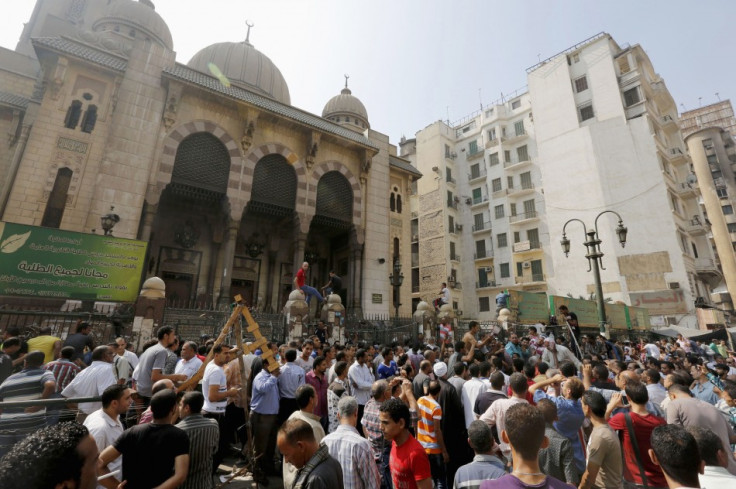Egypt in Crisis: Not Yet Ready for Democracy?

On 18 August 2013, General Abdul Fattah al-Sisi appeared on Egyptian state television calling the unrest, verging on civil war, which the world has been witnessing since the overthrow of Muslim Brotherhood President Mohammed Morsi on 03 July, "terrorism". Not a person to mince his words, the General did however offered an olive branch of sorts to his bloodied opponents stating:
"There is room for everyone in Egypt, and we are cautious about every drop of Egyptian blood," urging the Brotherhood to help "rebuild the democratic path" and "integrate in the political process."
There was nevertheless, very much the iron fist in the velvet glove as General al-Sisi warned that the military would not be silent in the face of violence. With his speech being widely quoted in the world's media, he proceeded to give a most uncompromising warning:
"We will not stand by silently watching the destruction of the country and the people or the torching (of) the nation and terrorizing the citizens."
Similar messages were being broadcast by other (interim) Government ministers including Egypt's Information Minister Dorreya Sharaf al Din who was quoted by the BBC as saying that the Cabinet wished to express its regret for the loss of life but will "continue to confront terrorism firmly", adding that several streets and squares throughout the country would be named after the soldiers who had been killed by, or due to, the actions of the Muslim Brotherhood and its supporters.
It will be of grave concern to Ms Sharaf al Din and her colleagues that on 19 August a new list of potential names can be added when 25, off-duty police officers were ambushed in the Sinai Peninsula and "executed" by suspected Islamist terrorists. Two of the officers were found alive but wounded although there are reports that they too have now died.
The attack occurred near the border town of Rafah and the Gaza strip where the Egyptian Government has had to curb almost daily incidents of late, not just against militant jihadists but very often against tribesmen in the Northern Sinai intent on smuggling and other criminal activities, including rocket attacks against Israel.
One significant point made by the Information Minister was that the Cabinet would review the legal status of al-Jazeera TV which Ms Sharaf al Din accused of threatening Egypt's security and stability. Al-Jazeera is based in Doha, Qatar and its Emir, Tamim bin Hamad bin Khalifa Al Thani (and his father before him) has strongly backed the Muslim Brotherhood.
Possibly charged with taking the battle to the world media and any potentially hostile (Western) governments, interim Foreign Minister Nabil Fahmy justified the widespread use of force against the Muslim Brotherhood and their supporters when on Sunday he showed TV footage of many of the protesters being armed and firing on the security forces.
These images have been fabricated according to spokesmen for the Muslim Brotherhood. Maybe true but spokesmen for the Muslim Brotherhood this week claimed that it was the Egyptian Army and security forces that burned down the country's churches and other Christian institutions over recent weeks.
Coptic sources however, such as Coptic World and the Maspero Youth Union (MYU), whilst saying that incidents had occurred when Hosni Mubarak was in power, put the blame squarely on the Brotherhood.
The MYU said that as many as 36 churches have been completely destroyed and a number of Christians - as yet no exact figures - murdered. A wave of particularly fierce attacks against Coptic monasteries and churches, schools, shops and businesses and other institutions took place on 14 August.
General al-Sisi has pledged that the military will cover the costs of restoration for all the destroyed churches.
Mr Fahmy went on to say that the Government was faced with an attempt "...to shake the foundations of the State." Following hints made by European Union officials and politicians in particular, that billions of dollars of aid and loans could be at jeopardy if the interim Government did not back down, Mr Fahmy said that he would shortly be reviewing all foreign assistance and:
"I want to determine what is useful and what is not and what aid is being used to pressure Egypt and whether this aid has good intentions and credibility. We will proceed based on our findings."
On the heels of this veiled threat as well as the pressure in the United States for President Obama to cancel $1.3 billion of military aid, a spokesman for King Abdullah of Saudi Arabia confirmed that the oil-rich Kingdom will make up any losses in Western aid.
Saudi Arabia, Kuwait and the United Arab Emirates have already pledged $12 billion in aid to Egypt in support of the military takeover.
Mohammed Morsi made a mockery of democracy, in fact if not always in speech. Egypt is paying very dearly for it. The West is seen by most in the Middle East to have abandoned his predecessor after decades of support and is in a poor position to act as honest broker - even if it could afford to. A long hard review looks in order.
© Copyright IBTimes 2025. All rights reserved.






















